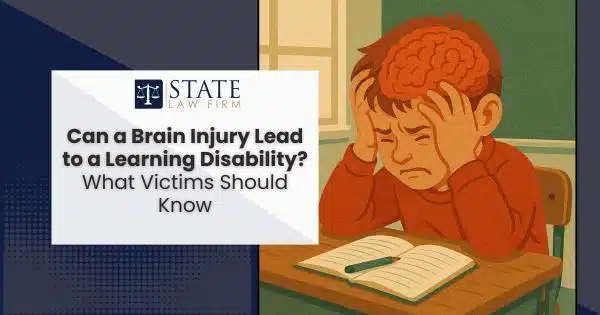Brain injuries can be life-altering in ways that often go far beyond the initial physical trauma. For many victims, the journey to recovery reveals new challenges, particularly in the areas of learning and cognitive development. According to the Centers for Disease Control and Prevention (CDC), approximately 2.8 million people sustain a traumatic brain injury (TBI) each year in the United States, and many experience lasting cognitive and learning difficulties (CDC Data).
At State Law Firm, we understand how overwhelming it can feel to cope with a brain injury’s ripple effects on daily life, academics, and long-term goals. As a boutique personal injury law firm based in Sherman Oaks, our young, dedicated attorneys focus on helping victims navigate the most challenging aspects of their recovery, whether it stems from a serious car accident or another unexpected incident.
In this guide, we’ll break down how brain injuries can contribute to learning disabilities, what signs to look for, how to get a proper diagnosis, and what support options and legal rights you should know about. For a deeper dive into the long-term effects of traumatic brain injuries, explore more of our insights and resources designed to empower you and your family.
Let’s get started—because understanding what to expect is the first step in protecting your future and your rights.
Understanding Brain Injuries: Types and Causes
Not all brain injuries are the same, and understanding their nature is vital when considering their impact on learning. Generally, brain injuries fall into two main categories: traumatic brain injuries (TBIs) and acquired brain injuries (ABIs).
- TBIs occur when an external force, like a blow or jolt to the head, disrupts normal brain function. Common examples include concussions from car accidents or sports injuries.
- ABIs, on the other hand, develop due to internal factors, such as a stroke, oxygen deprivation, or an infection affecting the brain.
Even a mild concussion can lead to temporary or lasting cognitive changes. Severe injuries may permanently alter the brain’s ability to process and retain information. If you or a loved one is struggling after an accident, our team at State Law Firm is here to guide you through understanding your condition and your legal options.
Pro Tip: Always seek prompt medical care after any head injury—early intervention can minimize complications and support stronger legal claims if negligence is involved.
The Link Between Brain Injury and Learning Disabilities
The brain governs how we learn, remember, and process information. When an injury disrupts these processes, it can lead to what’s medically recognized as a learning disability.
Victims may face:
- Cognitive impairments, such as slower thinking and problem-solving
- Memory issues make it challenging to recall instructions or lessons
- Neuropsychological changes, affecting attention span and organization
- Challenges with reading, writing, or mathematical reasoning
Children and young adults are especially vulnerable, as an injury can derail critical educational milestones. Whether the trauma stems from a sports injury or a collision, knowing this link is crucial for pursuing the proper support and legal remedies.
Signs and Symptoms of Learning Disabilities After a Brain Injury
Spotting the signs early can make a significant difference in recovery and academic success. Watch for:
- Consistent difficulty with reading or understanding new material
- Problems focusing or staying organized with schoolwork
- Noticeable changes in behavior, like increased frustration or withdrawal
- Forgetfulness about lessons, assignments, or daily tasks
Suppose these symptoms appear following a brain injury. In that case, it’s essential to connect with medical and educational professionals—and to understand that legal options may be available if another party’s negligence caused the injury.
Navigating Diagnosis: How is a Learning Disability Evaluated?
Diagnosing a learning disability in a brain injury victim requires a careful, multi-step approach:
- Differential diagnosis: Doctors rule out other possible causes for the struggles, such as emotional trauma or unrelated developmental delays.
- Neuropsychological assessments: Specialists conduct tests to evaluate memory, reasoning, and language skills.
- Educational evaluations: Schools often administer academic testing to determine the support services a student needs.
- Ongoing monitoring: Symptoms can evolve as the brain heals, so regular check-ins help adjust support plans.
Our team at State Law Firm has seen firsthand how a well-documented diagnosis can strengthen a personal injury claim and secure necessary accommodations in school and work settings.
Support Strategies for Victims with Learning Disabilities Post-Brain Injury
While facing a learning disability can feel overwhelming, numerous strategies and resources can help victims thrive:
- Individualized Education Plans (IEPs): Customized plans that outline academic goals and classroom adjustments.
- Special education services: Additional support staff, modified lesson plans, or tutoring to address specific challenges.
- Therapy options Include Speech therapy, occupational therapy, or cognitive rehabilitation, which can help rebuild vital skills.
- Community resources: Local nonprofits and educational advocates can guide families through the process of securing services.
We encourage families to explore every available option because rebuilding confidence and academic success takes a village.
Legal Rights and Resources for Brain Injury Victims Facing Learning Disabilities
Victims of brain injuries have necessary legal rights that protect them in educational settings and beyond:
- Disability rights laws, such as the Americans with Disabilities Act (ADA) and the Individuals with Disabilities Education Act (IDEA), require schools and workplaces to make reasonable accommodations.
- Educational advocacy: Parents can request assessments, IEP meetings, and dispute resolutions to ensure their child’s needs are met.
- Pursuing justice: If a brain injury is caused by negligence, such as a car accident or unsafe premises, victims may be entitled to compensation for medical care, special education costs, and future needs.
At State Law Firm, we stand by victims and families every step of the way. If you believe your child’s brain injury was preventable, we’re ready to help you hold the responsible parties accountable and secure the support your family deserves.
If you or a loved one is navigating a brain injury and its effects on learning, don’t face it alone—reach out to our dedicated team today and take the first step toward recovery and justice.


